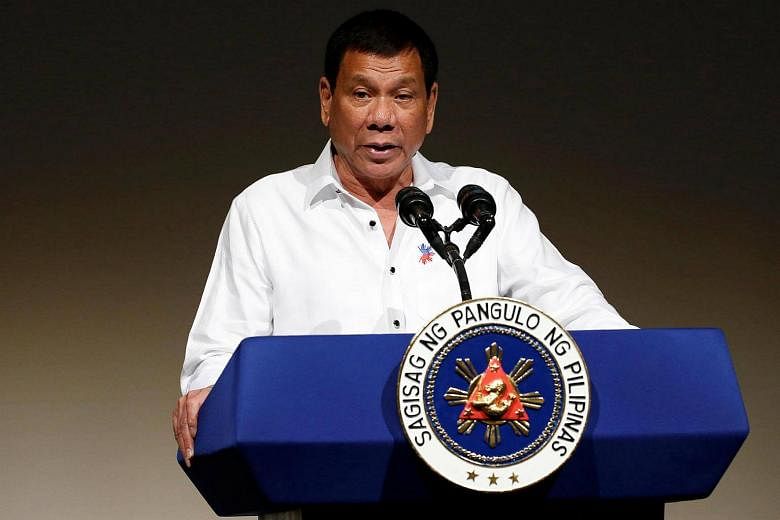TOKYO (REUTERS) - Philippine President Rodrigo Duterte sought to assure Japan on Wednesday (Oct 26) that his high-profile visit to China last week was about economics, not security, and vowed to stand on Tokyo's side over the disputed South China Sea when the time came.
Earlier in the day, Duterte reiterated his harsh words for long-time ally Washington, saying he might end defence treaties.
The volatile Philippine leader's visit to Japan comes amid jitters about his foreign policy goals after weeks of verbal attacks on the United States and overtures towards China.
Duterte last week announced in China his "separation" from the United States, but then insisted ties were not being severed and that he was merely pursuing an independent foreign policy.
His perplexing comments pose a headache for Japanese Prime Minister Shinzo Abe, who has tightened ties with Washington while building closer security relations with Manila and other South-east Asian countries as a counter-weight to a rising China.
"You know I went to China for a visit. And I would like to assure you that all there was, was economics. We did not talk about arms. We avoided talking about alliances," he told an audience of Japanese businessmen.
Duterte, speaking through a Japanese interpreter at the start of his talks with Abe, said he would stand on Japan's side in the contentious matter of the South China Sea.
Both Tokyo and Washington have grown worried that the commitment under Duterte's predecessor, Benigno Aquino, to stand up to China in the disputed South China Sea is under threat, although Japan has no direct territorial row with Beijing there.
Japan has a separate dispute with China over tiny, uninhabited isles in the East China Sea, and has been keen to stress the importance of the rule of law.
Aquino angered China by lodging a case with an arbitration court in the Hague challenging the legitimacy of Beijing's maritime claims in the resource-rich sea. The court's ruling in July emphatically favoured Manila but was rejected by China, which has warned Washington and Tokyo to stay out of the feud.
Duterte earlier told an audience of Japanese business executives he did not pick quarrels with his neighbours, but had tough words for Washington.
"I have declared that I will pursue an independent foreign policy. I want, maybe in the next two years, my country free of the presence of foreign military troops. I want them out," he said. "And if I have to revise or abrogate agreements, executive agreements, this shall be the last manoeuvre, war games between the United States and the Philippines military."
China claims almost the entire South China Sea, through which about US$5 trillion (S$7 trillion) worth of trade passes every year. Brunei, Malaysia, the Philippines, Taiwan and Vietnam also have claims on the sea, believed to have rich deposits of oil and gas.

